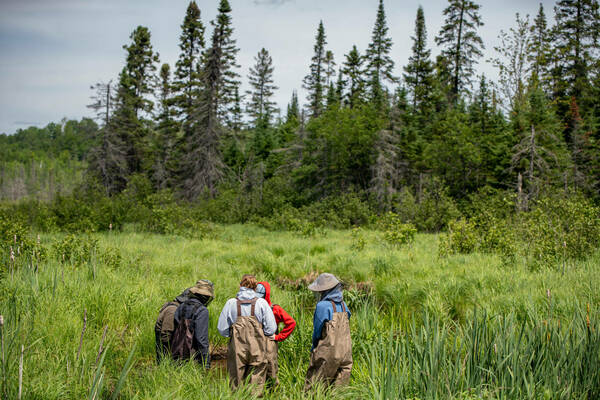
A new cohort of students will get the chance to participate in Graduate Fellowships at the University of Notre Dame Environmental Research Center (UNDERC) this summer. UNDERC, part of Notre Dame Research (NDR), has announced the names of six graduate students who will conduct research at its field research station, which crosses the boundaries of Michigan’s upper peninsula and Wisconsin. There, the fellows will collect data connected to their research interests and to ongoing projects in on-campus labs.
In addition to data collection, each fellow will mentor at least one undergraduate student who is undertaking their own independent research projects. Fellows will also partake in weekly seminars followed by a research symposium at the end of the summer.
The Gillen Director of UNDERC and professor in the Department of Biological Sciences, Nathan Swenson, noted how valuable field experience is for budding ecologists. He said, “The graduate students will benefit from this opportunity to go up to the UNDERC and be in a natural field setting for an extended period of time. These fellowships allow students to conduct world-class research while gaining mentoring experience and building connections with other students and faculty.”
The fellows in the 2023 cohort include:
- Cesar Bertinetti, a Ph.D. student in Assistant Professor Julian Torres-Dowdall's Lab in the Department of Biological Sciences, will investigate visibility conditions across aquatic ecosystems driving the adaptive evolution of visual systems in North American sunfish and the molecular mechanisms involved in this process.
- Debit Datta, a Ph.D. student affiliated with the Swenson Lab in the Department of Biological Sciences, is quantifying the heart rot (fungal decay of heartwood) of hardwood tree species using sonic wave measurements and linking these data to hyperspectral reflectance data taken from leaves.
- Laurel Anne Lown, a Ph.D. student with Assistant Professor Cristian Koepfli’s Lab in the Department of Biological Sciences, will collect data about mosquito populations at UNDERC, including describing mosquito diversity and determining host feeding behaviors.
- Chathuranga Senevirathne, a first-year Ph.D. student in Associate Professor Adrian Rocha’s Lab in the Department of Biological Sciences, is researching how tree heart rot impacts forest carbon fluxes.
- Puja Sharma, a Ph.D. student affiliated with Associate Professor David Medvigy’s Lab in the Department of Biological Sciences, aims to quantify the ability of xylem to conduct water changes over time across tree species with varying growth strategies.
- Greyson Wolf, a first-year graduate student with Professor Stuart Jones’s Lab in the Department of Biological Sciences, will be studying the effects of density dependence on largemouth bass population dynamics.
The fellowship program is oriented towards Notre Dame graduate students, but UNDERC also hosts undergraduate field courses each summer, where students are able to take courses and participate in research projects. Applications for both programs typically open in the fall of the academic year. To learn more about the available opportunities, please visit underc.nd.edu.
About UNDERC:
The University of Notre Dame Environmental Research Center (UNDERC) provides world-class destinations for environmental research, unsurpassed undergraduate education programs, and innovative graduate student training. UNDERC is a unique research location with exceptional facilities that permit descriptive studies and manipulative experiments. UNDERC researchers strive to enhance the world’s understanding of natural and human-altered environments that translate into better management and policy for the environment.
Contact:
Brett Beasley / Writer and Editorial Program Manager
Notre Dame Research / University of Notre Dame
bbeasle1@nd.edu / 574.631.8183
research.nd.edu / @UNDResearch
About Notre Dame Research:
The University of Notre Dame is a private research and teaching university inspired by its Catholic mission. Located in South Bend, Indiana, its researchers are advancing human understanding through research, scholarship, education, and creative endeavor in order to be a repository for knowledge and a powerful means for doing good in the world. For more information, please see research.nd.edu or @UNDResearch.
Originally published by at underc.nd.edu on March 07, 2023.